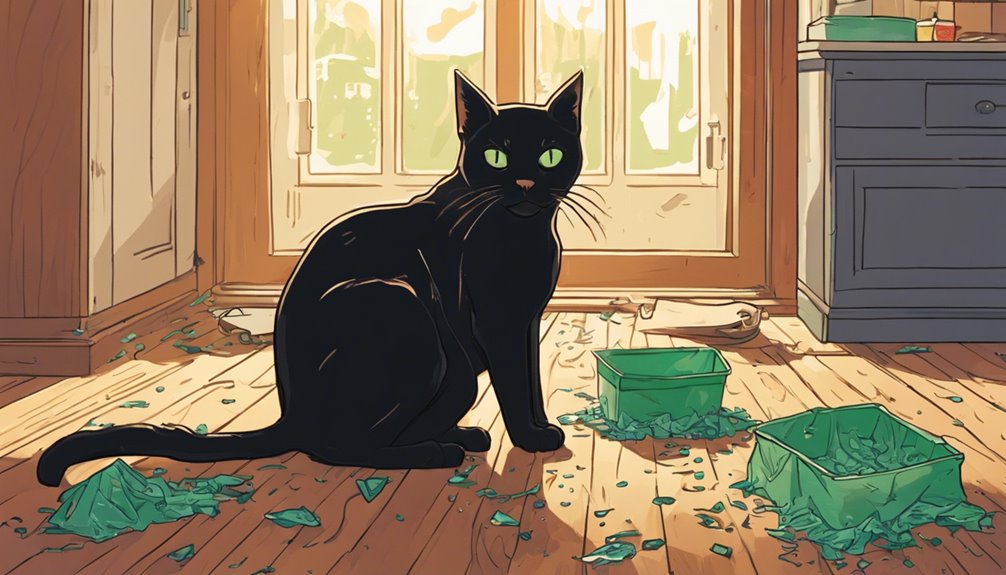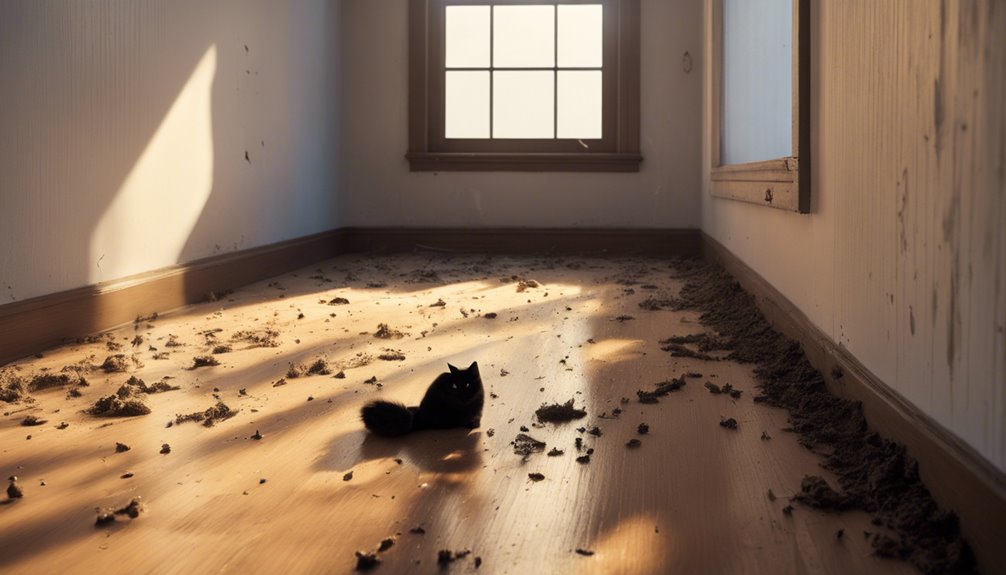If your cat's pooping on the floor, it could be due to several factors. Health issues like gastrointestinal problems or dietary changes might cause discomfort. Stress or anxiety from new pets, loud noises, or moving can disrupt their routine. Furthermore, litter box cleanliness and accessibility play a significant role; they may avoid it if it's dirty or in the wrong location. Territorial behaviors can also trigger accidents. Understanding these triggers is essential for addressing the issue. By exploring your cat's situation more, you can identify the root cause and help restore their comfort and habits.
Common Health Issues

When you find that your cat has pooped on the floor, it can be disheartening and confusing. One common reason could be gastrointestinal issues, which can stem from various health concerns. If you've recently made dietary changes, your cat might be reacting poorly to the new food. Cats can be sensitive to sudden shifts in their diet, leading to digestive upset. Conditions like inflammatory bowel disease or food allergies might also be at play. It's important to monitor your cat's overall health, noting any changes in appetite, weight, or behavior. If this issue persists, consulting your veterinarian is vital for proper diagnosis and treatment. Providing your cat with a balanced diet can help maintain their gastrointestinal health and overall well-being.
Stress and Anxiety Factors
Although changes in the environment might seem minor to us, they can greatly impact your cat's sense of security and well-being. Understanding stress triggers is essential in addressing cat anxiety that may lead to inappropriate elimination.
- New pets or family members
- Loud noises or changes in routine
- Moving to a new home
- Lack of safe spaces to hide
Your cat may be struggling to cope, and recognizing these factors can help you create a more calming environment. By reducing stressors and providing comfort, you can foster a sense of safety for your feline friend. Remember, a relaxed cat is less likely to exhibit unwanted behaviors, so pay attention to their needs and adjust accordingly.
Litter Box Problems

Many cat owners overlook the importance of litter box maintenance, yet it's one of the most common reasons for inappropriate elimination. Making sure your cat's litter box is clean and meets their preferences is vital for their wellbeing. If they don't feel comfortable, they might choose the floor instead!
| Litter Box Issues | Solutions |
|---|---|
| Litter box cleanliness | Clean it daily, change litter weekly |
| Wrong litter type | Experiment with different types (clay, crystal, natural) |
| Box size or accessibility | Verify it's the right size and easy to access |
| Location of the box | Place it in a quiet, low-traffic area |
Addressing these factors can help encourage proper litter box use, allowing your cat to feel secure and comfortable in their space.
Territorial Behavior
In addition to litter box issues, territorial behavior can greatly impact your cat's elimination habits. Cats are instinctively driven to establish their territory, and when they feel threatened, they might engage in territorial marking. This behavior often arises from their understanding of feline hierarchy, where asserting dominance can lead to stress and confusion.
- Your cat might feel insecure due to new pets or people.
- They could be marking their territory to assert dominance.
- Stressful environments can lead to accidents outside the litter box.
- Changes in feline social dynamics can trigger this behavior.
Changes in Environment

When a cat's environment changes, it can lead to stress and confusion, often resulting in inappropriate elimination behaviors. If you're moving to a new home or experiencing travel disruptions, your cat may feel unsettled. Cats thrive on routine, and sudden changes can disrupt their sense of security. They might respond by pooping on the floor as a way to express their anxiety or reclaim territory. To help your feline adjust, create a safe space with familiar items, such as their bed or favorite toys. Gradually introducing new areas and maintaining a consistent routine can also help ease their adjustment. Remember, understanding your cat's feelings is essential in guiding them back to proper litter box habits.
Frequently Asked Questions
Can Diet Changes Cause My Cat to Poop Outside the Litter Box?
Did you know that around 15% of cats may develop litter box issues due to dietary changes? When you switch your cat's food, it can introduce dietary triggers that affect their digestion and comfort. This might lead to them avoiding the litter box, especially if they associate it with discomfort. It's essential to monitor their litter box preferences and consult your vet if you notice any changes in behavior after altering their diet.
How Often Should I Clean My Cat's Litter Box?
When it comes to litter box maintenance, cleaning frequency is key. Ideally, you should scoop the box daily to keep it fresh and odor-free. This helps encourage your cat to use it consistently. Additionally, a full cleaning every week, including washing the box and replacing the litter, is recommended. By staying on top of this routine, you're creating a comfortable environment for your feline friend, which can prevent issues down the line.
Do Certain Cat Breeds Have More Litter Box Issues?
Imagine a garden of unique flowers, each with its own preferences for sunlight and soil. Similarly, certain cat breeds can exhibit distinct litter box behaviors. Breeds like Siamese may be more particular, displaying specific litter box preferences that reflect their sensitive nature. Understanding these breed behaviors can help you create a more inviting environment, ensuring your feline friend feels comfortable. After all, every cat deserves a throne they love to use!
Is It Normal for Kittens to Struggle With Litter Box Training?
It's completely normal for kittens to struggle with litter box training. Their behavior can be influenced by various factors, including age and environment. You might find that using positive training techniques, like rewarding them when they use the box, can encourage better habits. Patience is key; every kitten learns at their own pace. Remember, creating a comfortable space and being consistent with your approach can make a significant difference in their training journey.
What Should I Do if My Cat Is Pooping on the Floor Repeatedly?
When your cat's leaving little surprises on the floor, it's like a storm cloud hanging over your home. First, check for medical problems; a vet visit can rule out health issues. If all's well, explore behavioral issues. Cats might act out due to stress or changes in their environment. Provide a safe space, clean the area thoroughly, and consider more litter boxes. With patience, you'll guide them back to proper habits.




